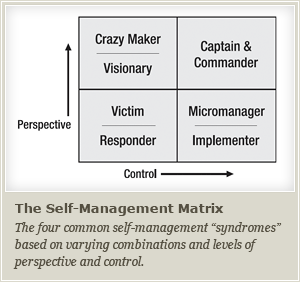The ideal model I’m proposing here incorporates a balance of perspective and structure, where an internal rather than an external source directs your energy and focus. This is the
state of flow, of being in your zone, of being “on.” You are guiding
your ship through the waves, wind, and water with a light touch on
the helm and a keen eye on the horizon. You are committed to a
course and prepared to make the slightest corrections that may be
required.
When you achieve this state, there is no sense of overwhelm, no
distinction between personal and professional, no dilemma of a life/work balance. It is possible to have this experience while
building a garden shed, playing with your cat, just sitting and thinking,
or working through a challenging meeting with your boss or
your board. This state isn’t dependent on the content or
substance of what you are doing, nor even if you particularly like doing
it. That doesn’t mean you can gain access to this positive experience
by just doing anything (wouldn’t that be nice?); if you could, you
would never fall out of this quadrant. The secret lies not so much in
what you’re doing, but in how you are engaged with what you’re doing.
And the optimal way to be engaged is to learn to walk the thin
line between function and form, vision and implementation, stretch
and structure.
Many Visionary/Crazy Maker types are deathly afraid of and resistant
to any form of “getting organized” because they equate it with
their opposite quadrant — the Micromanager. They are averse (and
rightly so) to the “anally retentive” constraints that can stifle risk taking
and momentum. Implementer/Micromanager types are likewise
repelled by any invitation to “make it up” and create their ideal scenarios, without sufficient evidence to support the possibility of actually
achieving it. They’re afraid they’ll be thrown into the maelstrom
of the Crazy Maker, endangering the stability of everything
and everyone around them.
This is not, however, an either-or situation, though many
people act as if it is. There is no freedom without discipline, no vision
without a form, no structure without a function. If there were no lines
painted on the road, you wouldn’t be free to let your mind wander and
be creative while you drive. You’d be too busy hoping no one hits you.
But if there were too many lanes and restrictions and rules, you’d have
traffic moving much slower than it should, as everyone tried to
pay attention to the right place to be. As precarious as walking the
critical line might be, there is an optimal relationship of control and
perspective. And when that is achieved, all is very well, indeed.
On the Negative Side
It would appear that there’s no downside to being in this quadrant,
for there’s nowhere further to go in terms of managing yourself. That
would be true if this were a simple, one-dimensional model. But it’s
not, for as you’ll see, these quadrants can be highly situation-dependent
as well as multilayered. Being on “cruise control” is great, until the
road takes a sharp and unexpected turn, or traffic suddenly screeches
to a halt because of an accident. In other words, you can get into a
rhythm and pattern that’s working, and potentially ignore something
you should be doing to keep it going that way. What future
crisis do you need to be preventing? What new vision should you be developing and evaluating to keep you fresh? What new structures
and processes might you be researching now to handle the increased
flow that will result from your success?
Theoretically, if you are Captain and Commander, you’ll also be
paying attention to those preventive maintenance and development
responsibilities . . . and on at least a subtle level you can’t really be
fully in your zone if some part of you is aware of those needs and
they’re not being addressed. But the point is, we can often seem to be
in a state of fully integrated flow, let ourselves get lax, and quickly lose control. The relief and contentment of
having your current situation in proper control and perspective can
easily seduce you into believing that you don’t need to be thinking
about the future.
Adapted from "Making It All Work" by David Allen, by arrangement with Viking, a member of Penguin Group (USA) Inc.
